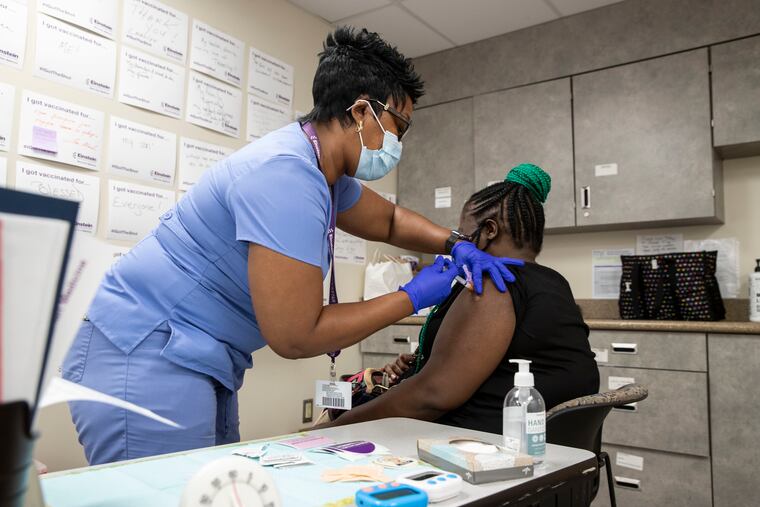The wicked problem of booster shots for Americans | Expert Opinion
We’ll likely need booster shots, but right now we should prioritize unvaccinated people around the world.

On Aug. 18, the Department of Health and Human Services released a statement outlining a plan to offer COVID-19 booster shots for all Americans starting in the fall. While high-income countries are developing strategies to distribute a third dose of the vaccine, low- and middle-income countries are in dire need of their first dose.
We are faced with a “wicked problem,” one that is difficult to solve because of the complex social interdependencies and lack of a good answer.
Concerns about vaccine effectiveness against COVID-19 variants and waning immunity are driving the rationale for booster campaigns. According to the science, a booster dose is most likely needed, though formal recommendations for the general public and data have yet to be released.
» READ MORE: U.S. has a plan for coronavirus booster shots. Pa. and Philly say they’re ready.
Here is what we do know: Protection with current vaccines from Pfizer-BioNTech and Moderna wanes against infection, though not hospitalization, which is good news. We also know that according to CDC data, about half of the U.S. population (only 51% fully vaccinated, 60% with at least one dose) is unvaccinated. Allowing a large proportion of people to remain unvaccinated increases the potential for the virus to mutate into new variants, making it more difficult to control.
The diminishing vaccine effectiveness amid an ongoing surge of cases caused by the more contagious delta variant underscores the need for heightened vigilance in the U.S. approach to the pandemic. This is why high-income countries, such as the U.S., secured vaccine allotments early in the pandemic to have enough doses to fully and adequately vaccinate their population, whatever the optimal schedule will look like upon review of data.
However, mitigating the rising tide of cases, largely attributed to unvaccinated people, and the challenge of more contagious variants surging, particularly in communities and countries with low vaccination coverage, requires a balancing act of complicated issues.
To control the pandemic, we cannot overlook the fact that most of the world is unvaccinated. As such, on Aug. 4, the World Health Organization called for a moratorium on COVID-19 boosters until 10% of the population of every country is vaccinated.
To date, more than half of the population in high-income countries have received at least one dose of a COVID-19 vaccine, compared to less than 2% of individuals in low-income countries. In parts of the world, many are waiting for vaccine doses to arrive, while other effective preventative measures such as physical distancing may be nearly impossible because of crowding, for example. Thus, vaccination is truly a lifeline, and it is the only clear way out of the pandemic. However, as we listen to the science, it is clear that a booster dose will most likely be required, which is a strategy that will inherently constrain global vaccine supply and exacerbate global inequity.
» READ MORE: COVID-19 booster shots are on the way for more of us starting Sept. 20. Here’s what you need to know.
Focusing efforts on unvaccinated individuals is critical, and most unvaccinated folks reside in low- and middle-income countries around the world. Approximately 4.48 billion doses of a COVID-19 vaccine have been administered globally, yet 76% of the world is not fully vaccinated.
Delaying booster programs in favor of shifting supply to countries with lower vaccination coverage shifts the direct benefit of those doses to individuals in countries with a high concentration of COVID-19 infection. Of course, shifting the vaccine supply to low- and middle-income countries is not a simple solution to the problem, as many countries face challenges in implementing programs with vaccines, some of which have particularly onerous requirements (e.g., ultracold chain storage requirements).
Therefore, it is a balancing act of many complicated issues of both individual and global public good.
Booster shots will most likely become part of the routine agenda in the future. However, with 68% of the global population waiting for their chance to receive their first vaccine, we will have greater success in slowing transmission of the disease and reducing the number of deaths by prioritizing vaccination of unvaccinated individuals around the world.
This also means, if you are unvaccinated, go get vaccinated.
Amelia E. Van Pelt is a global epidemiologist and postdoctoral fellow at the University of Pennsylvania Perelman School of Medicine and associate fellow at the Leonard Davis Institute. Angela K. Shen is a retired captain in the U.S. Public Health Service, visiting scientist at the Children’s Hospital of Philadelphia, and associate professor in the School of Medicine and senior fellow at the Leonard Davis Institute at the University of Pennsylvania. She is also a public health consultant.